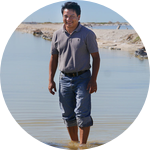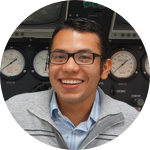About This Project
Artisanal fishermen risk their lives every day to support their families and communities. Using outdated technology without proper education, fishermen risk getting Decompression Sickness (DCS or "the bends") and Carbon Monoxide (CO) poisoning every time they work. Specifically in Mexico, these fishermen are experiencing 300 times the rates of DCS and death compared to recreational divers. Our project aims to save the lives of fishermen by drastically cutting DCS and CO poisoning rates with the development of a decompression table and air-compressor modifications.Ask the Scientists
Join The DiscussionWhat is the context of this research?
Our Goals Are Results:
The solutions we plan to implement are twofold; in the short term, we’ll build a working model of the air compressors these fishermen use. Because of how these compressor systems are designed, fishermen are exposed to high levels of carbon monoxide concentrations (about 70 ppm). Using our model, we'll test different filter structures, exhaust venting and absorption systems, as well as extended intake hoses to remedy this. We will be making these changes using cheap, readily available materials that the fisherman will be able to build and use for themselves in the future.
In the long term, we will be constructing dive tables with decompression stops and depth suggestions based on the dive behaviors we've recorded over the course of our study. These dive tables, in conjunction with other simple interventions, will mimic the abilities that dive computers give modern divers in avoiding Decompression Sickness. Once constructed, these dive tables will be able to be used by artisanal fisherman communities in countries all over the world such as Venezula, Central America, South America, and South Korea.
What is the significance of this project?
The Problem:
Mexican artisanal fishermen
dive to deep depths in the Gulf of Mexico in order to catch lobster and fish. These fishermen are untrained and use modified dive techniques based on trial and error. To dive to lobster/fish catching depths, they use a system of surface-supplied compressed air, specifically a Hookah system, where the air is continually supplied through a single hose that leads from an air tank on the boat down underwater to the fisherman.
In using this system, we’ve identified two major health risks for the fishermen that have lead to critical injuries, paralysis, and occasionally death. First, the compressor system’s air intake is directly next to the engine’s exhaust- causing fishermen to breathe in extremely toxic combustion particles. When testing the air, we found that the fishermen breathe in about 70 ppm of carbon monoxide, a level that’s twice the Department of Health’s inhalation estimate for chronic heavy smokers. For reference, the United States sets the legal exposure limit at less than 10 ppm of carbon monoxide in a compressed gas source, a limit exceeded 7 times over in duration and concentration. Secondly, the Hookah system permits the fisherman to have a constant, endless air supply from the environment allowing for greatly extended underwater exposure. It is estimated that a hookah fisherman can stay underwater 2-3 times longer than a diver using a SCUBA system. For both of these reasons, the number of decompression sickness hits (DCS, or “the bends”) in these types of fishing communities is much greater than expected. Recreational divers normally experience a decompression sickness rate of 0.105%. The villagers we are studying are currently experiencing a 33.0% DCS rate, a 300 fold increase; additionally, this rate does not include the many divers that survive DCS but do not report their symptoms due to distance, time, and cost. Our hope is to severely cut this rate, and start the process of providing reliable access to care when the worst does occur.
This research will be one of the first studies ever conducted on dive patterns of hookah-system fishermen, and will directly impact the lives of hundreds of people in the future. With your backing, we can execute the interventions discussed and hopefully provide a revolutionary relief to the artisanal fisherman of the Yucatan Peninsula.
What are the goals of the project?
Funds will be used towards building a hookah system model, implementing interventions, analyzing dive profiles and patterns, and travel expenses to implement the interventions.
Budget
Part of your donation will go towards the purchase of 5 additional dive computers to increase the rate of data collection for our dive profile calculations. This additional data will greatly increase the accuracy and effectiveness of the safety measures we hope to enact.
Donations will also be used to build a model hookah compressor, so that we can pinpoint the locations of harmful chemical production and exposure. This model will also be the mock up for our intervention designs; this includes a filtration system to reduce the levels of carbon monoxide/dioxide the divers are exposed to, an exhaust vent that keeps all engine gases away from the air intake, and an intake mast that will keep the divers' air supplies out of harm's way. All designs will be made from common, easily purchased materials so that all fisherman will be able to adapt their own solutions to their specific equipment.
Finally, funds will be used to cover travel and lodging while implementing the constructed interventions and holding educational meetings with town leaders on dive safety.
Endorsed by
Meet the Team
Team Bio
Walter Chin is the Principal Investigator on this project. He currently is the Program Director and practicing R.N. for the UCLA Gonda Center for Wound Healing and Hyperbaric Medicine, President-elect of the Undersea Hyperbaric Medical Society Pacific Chapter, and is pursuing a PhD in nursing.Walter has 10 years of experience in Hyperbaric Medicine and has successfully completed over 800 recorded hyperbaric treatments and approximately 360 hours of ICU and Critical Care treatment. He has been first author on multiple publications and a total of 16 published articles and abstracts. This study is one of his latest projects and has already been a year in the making, with two seasons of dive profile data already collected.
Walter Chin
Ocean, Ocean,everything to do with bubbles
Lab Notes
Nothing posted yet.
Project Backers
- 22Backers
- 100%Funded
- $6,000Total Donations
- $283.33Average Donation



